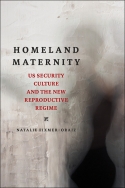From the University of Illinois Press website:
Motherhood and motherland in contemporary America
In US security culture, motherhood is a site of intense contestation—both a powerful form of cultural currency and a target of unprecedented assault. Linked by an atmosphere of crisis and perceived vulnerability, motherhood and nation have become intimately entwined, dangerously positioning national security as reliant on the control of women's bodies.
Drawing on feminist scholarship and critical studies of security culture, Natalie Fixmer-Oraiz explores homeland maternity by calling our attention to the ways that authorities see both nonreproductive and "overly" reproductive women's bodies as threats to social norms—and thus to security. Homeland maternity culture intensifies motherhood's requirements and works to discipline those who refuse to adhere. Analyzing the opt-out revolution, public debates over emergency contraception, and other controversies, Fixmer-Oraiz compellingly demonstrates how policing maternal bodies serves the political function of securing the nation in a time of supposed danger—with profound and troubling implications for women's lives and agency.
Associate Professor Natalie Fixmer-Oraiz is on the faculty of the University of Iowa Departments of Communication Studies and Gender, Women's, and Sexuality Stuides. She has published articles on rhetoric and reproduction, the commercial surrogacy industry, and third-wave feminism, as well as book chapters on the public debates surrounding birth control and communication activism pedagogy. Her research appears in journals and edited volumes, including Communication and Critical/Cultural Studies, Women’s Studies in Communication, and Frontiers: A Journal of Women Studies. She serves on the editorial board of Quarterly Journal of Speech and Women’s Studies in Communication and is the co-author of the textbook Gendered Lives: Communication, Gender, and Culture, with Julia T. Wood.
